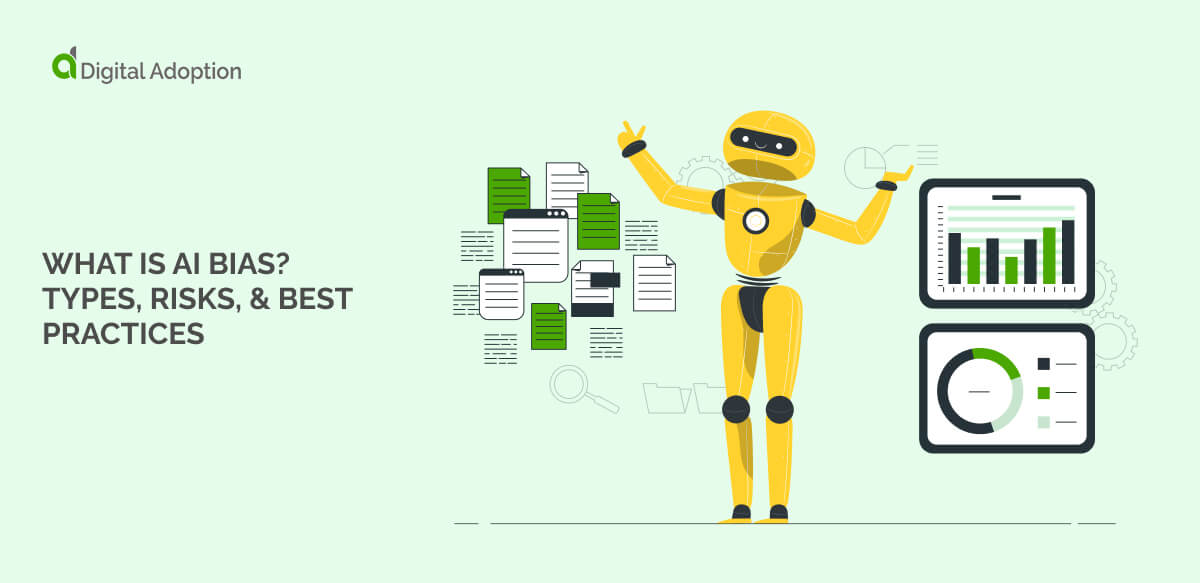If you’re a business owner, you’ve probably heard that digital transformation is critical. Of course, you want to adopt innovative technology. Obviously, you want to digitize manual processes. It’s a no-brainer, right?
Well, not always.
Digital transformation is about change— and people resist change. If you’re running a business and you want to drive up digital adoption, you’ll need to be able to sell the idea to your leadership team and your employees.
You need to be able to clearly articulate the benefits of digital transformation. You need to show them why it’s a no-brainer.
In this article, we’re going to do just that. We’ll unravel the importance of digital transformation with useful statistics from industry leaders along the way.
We will cover the benefits of digital transformation, list five key reasons why digital transformation strategy is important, and then explore the future of digital transformation efforts.
By the time you’re done reading, you’ll understand why digital transformation is paramount to modern businesses. And you’ll be able to sell digital transformation initiatives to anyone.
What’s All the Fuss About? The Benefits of Digital Transformation

It’s important to remember that digital transformation isn’t a tool. It isn’t a tangible thing. It’s an iterative process and a philosophy for digital adoption.
Because of this, the benefits of a digital transformation journey are vague and shapeless. Whatever your goals as a business leader, a digital transformation journey could be how you get there. But it’s not enough to say that “digital transformation is how we will reach our goals.”
In business, we often resort to hard metrics to demonstrate the value of something. And what metric do companies care about more than any other? Cash. Profit. Revenue.
Thankfully, industry leaders have been measuring the benefits of digital transformations using just that metric for many years now: In a recent survey, Deloitte found that companies with higher digital maturity reported 45% revenue growth.
The bottom line is that digital transformation directly benefits your bottom line.
And the list of benefits doesn’t stop there.
Digital transformation strategies promote Agile business practices. By that, we mean that one of the best ways to build an Agile business is to adopt digital technologies.
An Agile business uses Agile principles to respond quickly and effectively to change. Agile companies value flexibility and can make and execute decisions faster than traditional businesses.
Agility in business gives you much more of a competitive advantage than you may realize. There’s a popular business theory known as The Inherent Problem.
The Inherent Problem describes how the biggest waste of time in an organization is the requirement of leadership to approve decisions. Agile business practices address this issue. And digital transformation promotes Agile business practices.
You could say, then, that on top of directly benefitting your bottom line, digital transformation addresses the biggest common problems that businesses face.
5 Reasons Why Digital Transformation is So Important
Let’s dive down a little deeper.
We’ve discussed the benefits of digital transformation and established that it’s useful for giving you an edge over your competitors.
But for modern businesses, it’s more than that. In today’s digital age, digital transformation is necessary to keep up.
Here are five reasons why digital transformation is important for businesses in today’s environment:
- The modern customer expects on-demand services.
- Employee productivity relies on effective digital technologies.
- Companies need to be resilient to disruptive change.
- Business relations must be made more efficient.
- Leaders have to make better decisions faster.
Let’s drill down into these reasons and discuss why they’re so important.
- The Modern Customer Expects On-Demand Services
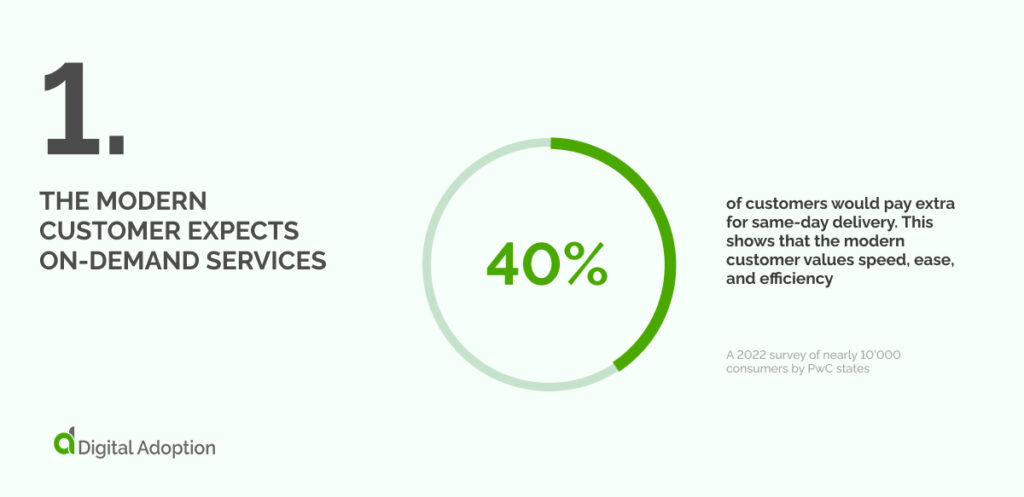
With any new technology, there is a period of consumer uncertainty. This period is long past for automation technology.
The digital revolution has completely changed customer expectations. Customers now expect to find what they need immediately and expect a seamless digital experience that meets their needs.
A 2022 survey of nearly 10’000 consumers by PwC states that 40% of customers would pay extra for same-day delivery. This shows that the modern customer values speed, ease, and efficiency.
Simple services need to be faster and more easily accessible. The most common way to achieve this is through digital transformation, such as:
- Opening multi-channel lines of communication with customers.
- Deploying AI-driven chatbots to solve simple queries.
- Creating highly tailored content and personalized experiences for customers via digital channels through machine learning technology.
If you want to use digital transformation to drive business growth and enhance customer experience, that’s where you should start.
- Employee Productivity Relies on Effective Digital Technologies
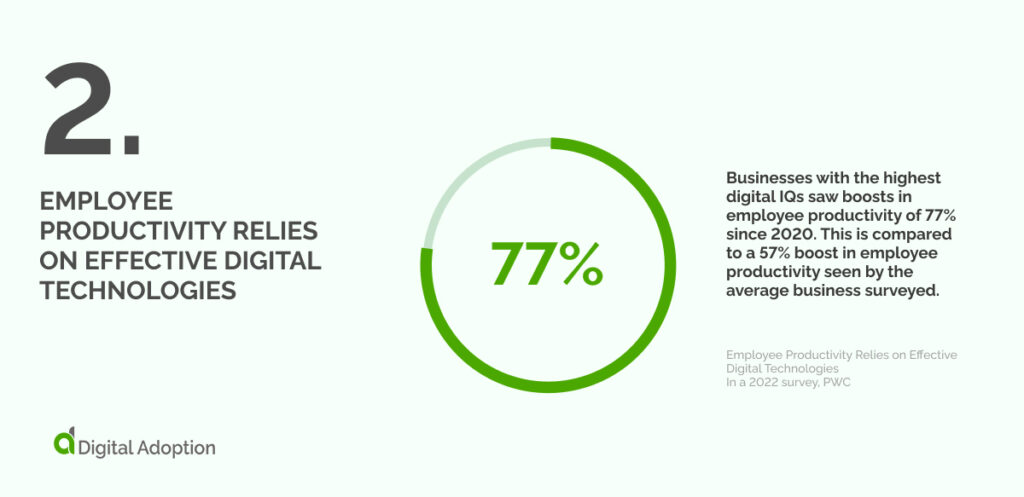
Digital transformation doesn’t just benefit customers and helps businesses engage with their employees more effectively, increase their productivity, and drive better performance.
In a 2022 survey, PWC found that businesses with the highest digital IQs saw boosts in employee productivity of 77% since 2020. This is compared to a 57% boost in employee productivity seen by the average business surveyed.
New digital tools like automation and artificial intelligence can help streamline processes, while cloud computing can make collaborating easier.
- Businesses Need to Build Resilience to Disruptive Change
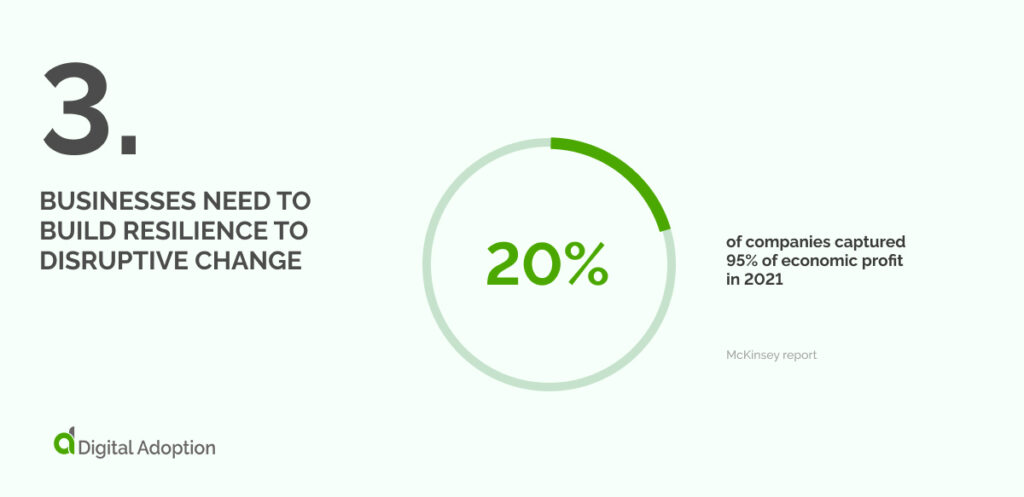
In today’s digital-first world, businesses must be prepared for disruption from many sources.
Disruption can occur because of competitors, market shifts, current affairs, or several other reasons.
Let’s take the Covid-19 pandemic as a case study for the disruption caused by current affairs.
Recent analysis from McKinsey suggests that the COVID-19 crisis widened the gap between the top economically performing companies and their competition.
Another McKinsey report indicates that the top 20% of companies captured 95% of economic profit in 2021.
What did these top companies have that allowed them to thrive while most other businesses struggled?
The answer is that top companies could adapt to the situation quickly without disrupting their operations.
Employees who suddenly worked entirely remotely were unaffected because they had already received training with the necessary digital tools. They knew the drill.
Digital transformation helps businesses be more resilient to disruptive change by providing the digital infrastructure to anticipate and respond rapidly to digital disruptions.
- Business Relations Must Be Made More Efficient

As digital solutions become more readily available, customers demand more and more.
It’s clear that collaboration between businesses is necessary to keep up with the growing demand. The problem is that engagements with other companies are slow. Non-disclosure requirements, red tape, security concerns, and the like often hamstring them.
Digital transformation helps businesses build digital networks with their partners, suppliers, and customers.
This digital network enables faster communication and collaboration without compromising customer data security, improving customer service, increasing efficiency, and cost savings.
- Leaders Must Make Better Decisions, Faster

Every business has a strategy. Every company has a plan for where they want to be in a year. But things don’t always go to plan.
In those moments, a company looks to its leaders to make decisions. And intuition doesn’t cut it anymore.
In the digital era, things are changing faster than ever, and plans (while still important) grow more unreliable.
Leaders need to be able to make data-driven decisions. They need to be able to adjust course at the drop of a hat. But leaders can’t process the data required to make better decisions.
Digital transformation helps leaders make more informed decisions by providing access to data analytics tools. These digital tools offer invaluable insights into customer behavior, trends, and market shifts, allowing leaders to respond quickly and make better business decisions.
How Can Businesses Prepare For Digital Transformation In 2023?
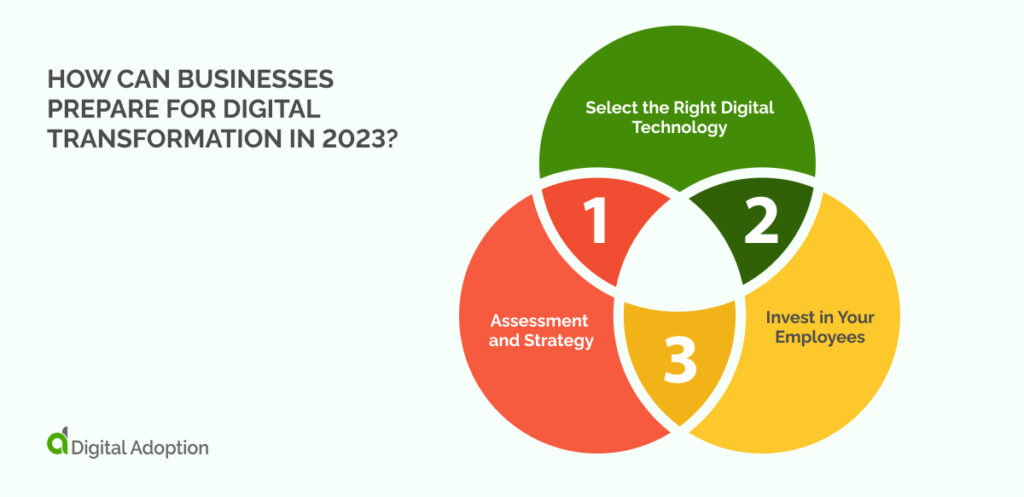
If your business is relatively new to digital transformation, there’s one thing you need to understand:
A digital transformation is no longer an option; it’s a necessity.
Businesses need digital solutions to optimize operations, build resilience, drive efficiency, and make better decisions quickly.
If you’re looking to prepare for digital transformation trends in 2023, take these best practices into account:
Assessment and Strategy
The first step in digital transformation is to assess the current digital capabilities of your organization. Doing so will give you a bird’s eye view of where digital transformation must be implemented.
Start setting goals and objectives for digital transformation. Develop a digital strategy that outlines the desired outcomes, timelines, and resources required to implement digital solutions in your organization. This is essential for ensuring you stay on track with your digital transformation initiatives.
Select the Right Digital Technology
Selecting digital tools that cater to your specific needs is also important. There are plenty of digital solutions available, so make sure you take the time to research and understand which digital tools are best for your organization.
Doing so will help you identify the low-hanging fruit— the easiest digital transformation initiatives to implement and have the biggest impact on your business.
Invest in Your Employees
Finally, review internal processes and develop training plans to ensure employees have the skills to use digital tools efficiently. Skilling up employees is an important but often overlooked step in digital transformation.
These are just the basics, though. If you’re looking for more in-depth and specific examples of how the digital transformation landscape could change in 2023, check out Reimagining Digital Transformation.
Digital Transformation Strategy: A Perspective On The Future
Digital transformation is reshaping how businesses operate, from their digital tools to their customer service practices.
As digital technology continues to evolve, digital transformation will become an even more important business strategy for those that want to remain competitive.
The digital age has brought many opportunities and innovations, transforming how businesses interact with customers, improving efficiency, and increasing profits. By taking advantage of digital transformation efforts now, companies can ensure they remain competitive in the future—and reap the benefits of digital transformation.
In conclusion, digital transformation will be important for businesses in 2023. It can help increase employee productivity, build resilience to disruptive change, improve business relations, and enable better decision-making.
Investing in digital transformation now will ensure your business is well-positioned to succeed in the digital economy of 2023 and beyond.












